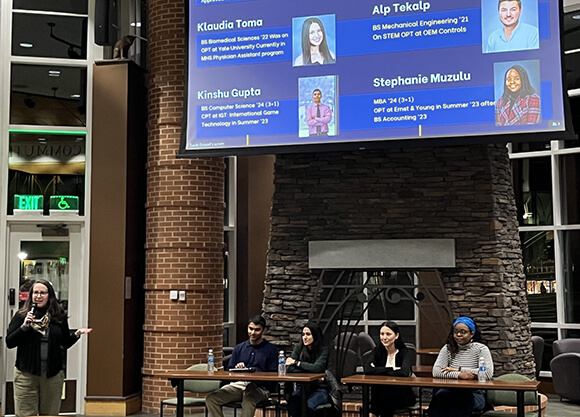
Quinnipiac international alumni and students discuss ‘Working in the U.S.’
November 15, 2023

November 15, 2023

The event in the Student Center Piazza on the Mount Carmel Campus hosted panel members Isabella Diaz Alba, MHS ’23; Khushi Agnish, ’23; Kinshu Gupta, ’24, MS ’25; Stephanie Muzulu,’ 23, MBA ’24, and Klaudia Toma, ’22.
From internships to hiring into career roles, panelists shared their experiences and advice and answered questions to assist in navigating the path to finding successful work in various fields.
The discussion was moderated by Sarah Driscoll, director of international student services. Driscoll works with all international Quinnipiac students on their educational and professional journeys.
Driscoll said the majority of international students receive a certificate of eligibility for nonimmigrant (F-1) student status and receive other authorizations to assist in pursuing further academic and career-related opportunities.
“All of the panelists are on an F-1 student visa, and with that visa comes certain work authorizations that enable students to do off-campus work and internships,” said Driscoll.
One such authorization is Optional Practical Training (OPT), which allows students 12 months of post-completion OPT per degree level.
“If you’re graduating in May, you become eligible to apply for your post-graduate OPT starting in February," said Driscoll. "You don't need to have a job to apply for OPT, you’re just applying for permission to work. OPT is really the time that you can navigate through and find the job that’s right for you.”
Following one year of OPT, a STEM OPT is also available for certain majors within STEM fields, for an additional two years. Panelist Alp Tekalp, ’21, who was unable to attend the event, is currently on STEM OPT in his role with OEM Controls, said Driscoll.
Another type of authorization is for Curricular Practical Training (CPT), which most students use during their studies to undertake an internship or any off-campus work.
Gupta has CPT authorization which allowed him to complete an internship with an IT company this past summer. Muzulu has interned with an accounting firm for the past two summers utilizing her OPT authorization.
With her OPT authorization, Toma is attending Yale University as a graduate student in the Physician Assistant program. Toma also worked at Yale for almost two years prior to entering graduate school.
After graduating with her MHS in January 2023, Alba’s been working as an assistant research scientist at New York University’s Grossman School of Medicine with her OPT. She joined the discussion panel via Zoom from New Jersey.
Alba said she plans to transition from her F-1 visa and is applying for an H1B visa, which allows U.S. employers to sponsor international workers to be employed in specialty occupations. Alba also hopes to be able to continue her education in the U.S. in the coming years.
“Don’t be super-stressed if things aren’t happening on the timeline you think they should be happening on because there are many roads to the same goal,” Alba advised.
Agnish has OPT authorization and is currently working as a research assistant at Yale University. When it comes to finding a job, she recommended networking with as many people as possible. Agnish said meeting Toma at last year’s Quinnipiac panel discussion led to her current work at Yale.
“I came to this event, and I met Klaudia, and she helped me get my position,” said Agnish. “So just talk to people. Because what’s the worst thing that could happen? You’re going to get a 'no,’ which doesn’t hurt as much as if you never spoke to someone where you could have had an opportunity and you missed out on it.”
Driscoll said students can find resume-building resources within their schools and, for a more general review of their resume and interviewing skills, tap into the offerings of the Office of Career and Professional Development.
“Really utilize those resources," said Driscoll. "They’re free, and having multiple people look at your resume is always a good thing."
In addition to discussing how they started their searches for internships and work, the panelists also brought up some common questions and some shared concerns. One concern was whether being an international student could be a hurdle to hiring.
“I got a job at Yale and Yale hires a whole bunch of international students, so it wasn’t really an issue,” said Toma. “We always feel like we’re not as welcome as someone else who’s able to work because we have some type of barrier. You have to realize how much you bring to the table. We all have to realize our worth and how much harder we have to work to achieve anything.”
Toma said there are companies that recognize that hard work.
“If they want you to work with them, they’ll find a way to keep you,” she said.
Audience members were invited to meet with the panelists during a mixer following the discussion.
“I was actually here last year at this same event, in the same shoes as you,” said Gupta. “So I’ve been through it, and I’m still going through it. I might have done some of the same things that you have done, and I hope to help you with any questions you might have.’’
Quinnipiac Today is your source for what's happening throughout #BobcatNation. Sign up for our weekly email newsletter to be among the first to know about news, events and members of our Bobcat family who are making a positive difference in our world.
Sign Up Now